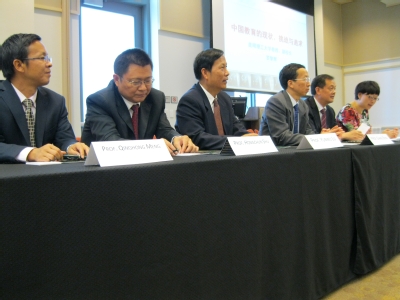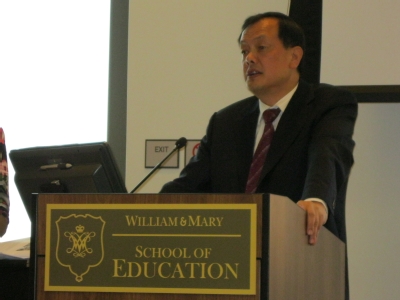EAST-MEETS-WEST Education Colloquium
 Students and faculty participated in a November 8th colloquium on Chinese education issues at the School of Education made possible by a partnership between the W&M School of Education and Yunnan Normal University. Many students were part of the W&M Chinese Studies classes taught by Prof. Yanfang Tang and Prof. Emily Wilcox. A six-member delegation of high-ranking provincial government officials and administrators from three different universities in Yunnan Province toured the School led by Dean Virginia McLaughlin and Assoc. Dean Chris Gareis prior to the colloquium. The delegation was interested in understanding the W&M admissions system for students in professional programs, U.S. teacher evaluation systems, and any unique features or strengths of W&M and the School of Education.
Students and faculty participated in a November 8th colloquium on Chinese education issues at the School of Education made possible by a partnership between the W&M School of Education and Yunnan Normal University. Many students were part of the W&M Chinese Studies classes taught by Prof. Yanfang Tang and Prof. Emily Wilcox. A six-member delegation of high-ranking provincial government officials and administrators from three different universities in Yunnan Province toured the School led by Dean Virginia McLaughlin and Assoc. Dean Chris Gareis prior to the colloquium. The delegation was interested in understanding the W&M admissions system for students in professional programs, U.S. teacher evaluation systems, and any unique features or strengths of W&M and the School of Education.
The delegation consisted of:
 Prof. Luo, Lihui – Vice President of Kunming University of Science & Technology & Vice Chairman of the Chinese People's Political Consultative (CPPCC) Yunnan Provincial Committee
Prof. Luo, Lihui – Vice President of Kunming University of Science & Technology & Vice Chairman of the Chinese People's Political Consultative (CPPCC) Yunnan Provincial Committee
Prof. Pu, Hong – Director of the International Office at Yunnan Normal University
Prof. Deng, Gang – Director of International Cooperation at Kunming University of Science & Technology
Prof. Shu, Hongchun – Director of the Graduate Office at Kunming University of Science & Technology
Prof. Lu, Yunwi – Education Chief, CPPCC Yunnan Provincial Committee
Prof. Meng, Qinghong – Vice Office Chief, CPPCC Yunnan Provincial Committee
Prof. Luo offered a presentation at the colloquium on the current situation of Chinese education in a country with a population of 1.3 billion and a rapidly growing economy. The rapid growth of the Chinese economy has pressured a faster development of Chinese education with a need to improve teacher education, to move to a better educated population, to modernize its education system, and to focus on life-long learning by the year 2020. Chinese education faces the challenges of insufficient investment in education (only 3.5% of GDP is spent on education), an unequal distribution of education resources (too much emphasis on higher education as opposed to primary and secondary education and an imbalance between urban and rural resources with eastern coastal cities receiving a disproportionate share), and the achievement of educational fairness for at-risk populations. According to Prof. Luo, Chinese education needs to be less focused on top students, grades, and intelligence in a traditional Chinese pedagogy which emphasizes memorization at the expense of student creativity. He opened the floor for questions from students and faculty. Many of the questions posed were asked in Chinese and received in-depth responses from the Chinese delegation.